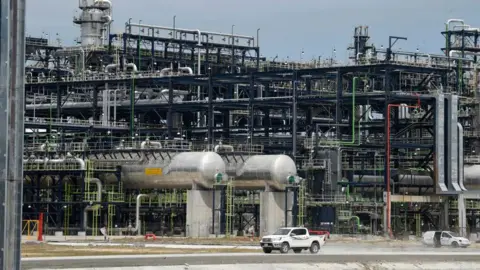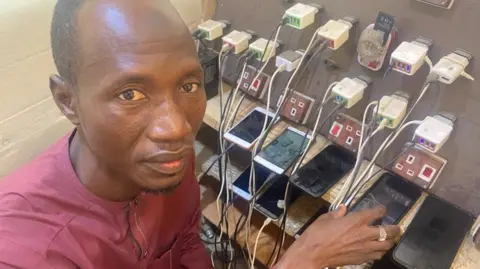Why Nigerians are praying for the success of a new oil refinery
 Getty Images
Getty ImagesA prayer was held a few months ago in Kano, a very religious city in northern Nigeria.
It was organised to pray for the success of a huge new Nigerian oil refinery that next month is due to start producing petrol for the first time.
Praying for such an industrial facility might seem incongruous, but many Nigerians are hopeful that the Dangote Petroleum Refinery will lead to both a big increase in the availability of petrol, and a subsequent drop in prices.
The $19bn (£15bn) refinery, based along the coast from Nigeria’s commercial hub Lagos, in the south of the country, is the size of almost 4,000 football pitches.
Its construction began back in 2016, and it started production of diesel and an aviation fuel in January of this year. Petrol is now set to follow.
The hope is that the facility will end Nigeria’s dependence on imports of these fuels.
While Nigeria is Africa’s largest producer of crude oil, and the world’s 15th biggest, none of its existing government-owned refineries are operational.
The privately-owned Dangote refinery has been built by Africa’s richest man, Aliko Dangote.
Born in Kano, the 67-year-old has a net worth of $12.6bn (£9.7bn), according to Forbes magazine.
Via his company, Dangote Group, he made his fortune in cement and sugar before taking on what many say is his biggest challenge yet when he launched the refinery.
 Getty Images
Getty ImagesThe recent prayer session in Kano was organised by shop owner Lado Danladi, and held at a nearby mosque. He was joined by some of his neighbouring shopkeepers.
“I run a small phone charging shop, and every day I buy $5 petrol for my small generator as there’s no stable electricity,” says Mr Danladi. “But since I heard about the Dangote Refinery I have been praying for its success.
“I can't estimate the hours I have lost trying to get fuel in the past during shortages, so hopefully the refinery will end the suffering, and help small businesses like mine get cheap and easy fuel.”
Mr Danladi’s fellow shop owners, a meat seller, and a drinks vendor all have similar complaints of buying “expensive” fuel to power generators.
For decades Nigerians enjoyed subsidised petrol prices. But last year incoming President Bola Tinubu stopped the subsidies, saying that they were no longer affordable. This led to prices surging by as much as four-fold.
Then this spring and early summer, shortages of petrol led to queues outside petrol stations, and the state-owned Nigerian National Petroleum Company warned against people panic buying.
The situation is not helped by Nigeria's corruption problem. According to the closely-watched global corruption index, from non-governmental organisation Transparency International, Nigeria ranks 145th out of 180 countries.
The higher the placing, the more corrupt a country is deemed to be.

The Dangote refinery will have the capacity to produce 650,000 barrels of fuel per day once fully operational.
Devakumar Edwin, vice president of Dangote Group says the refinery will be producing 500,000 before the end of August, which will exceed the country’s 480,000 barrels per day usage. The aim is to export the surplus.
Abubakar Maigandi, the president of Nigeria’s independent petrol marketers, who has been in the oil business for 30 years, says the Dangote refinery will solve their longstanding logistics problem.
“I foresee Dangote refinery solving the logistics issue we face at the moment trying to get hold of imported petrol for consumers, since this will be refined here in Nigeria,” he says.
“This will also mean cheaper petrol for Nigerians since importation costs have been removed. My hope is also that Dangote refinery deal with us directly without middlemen who will complicate things.”
Meanwhile, Mr Dangote said in an interview on 21 July that he might be prepared to sell the refinery in the future to the state-owned Nigerian National Petroleum Company.
Speaking to the Premium Times newspaper, he said that some people were opposed to him owning such a crucial facility.
Nigerian public affairs analyst Sani Bala says the Dangote refinery needs to “crash the price of petrol” for its impact to be felt across the country.
He adds: “Personally, I also think we shouldn’t be solely relying on the Dangote refinery for our energy needs. What if something happens to it? We go back to drawing board. There should be another working refinery.
“Also, as an environmental activist it also concerns me the level of emissions, we’ll be seeing from this mammoth oil refining facility not forgetting the impact on those communities nearby.”
Speaking about the impact of the facility on local people, a dialogue was held to discuss concerns last year.
Youth leader Arepo Azeez says there are numerous issues, such as “vibrations” from the refinery. "We also worry over possible accidental discharges of crude oil into the waters, incidences of mishandling of equipment, which will result in the spilling of crude oil, and even refined products when the refinery fully comes on stream."
Yet for Mr Lado back in Kano, he is really looking forward to the prospect of much cheaper petrol.
Additional reporting by Nkechi Ogbonna.
